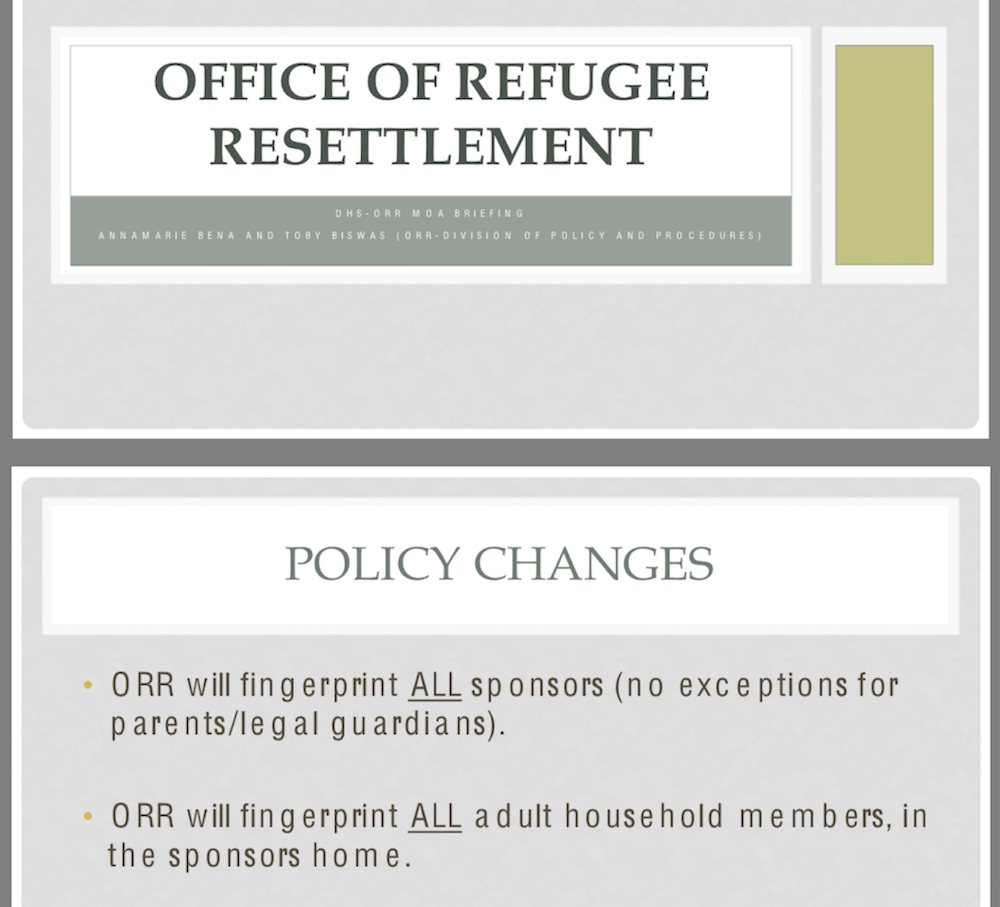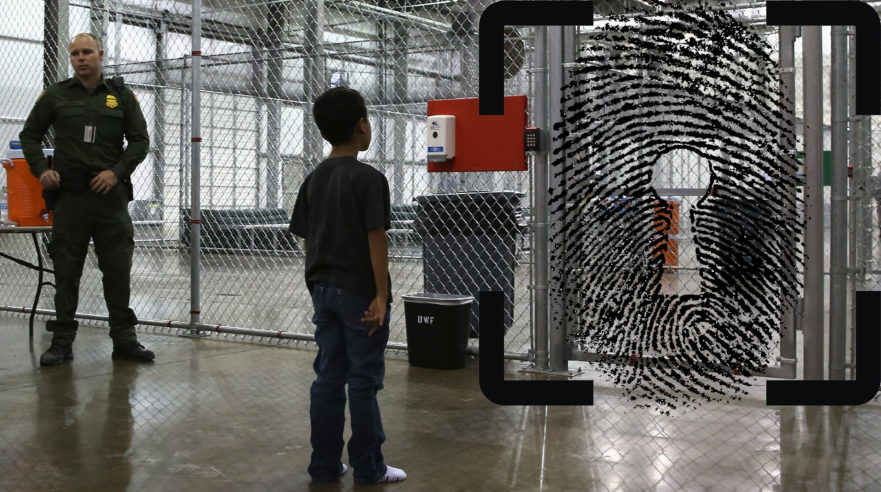Sponsors for undocumented children are being deterred from claiming them by new ICE policy of checking all fingerprints. (Photo illustration; photo by John Moore/Getty Images)
By Alex Kotch
An invasive new Trump administration fingerprinting policy for families seeking to sponsor immigrant children is already having a chilling effect on reunifications, an immigrant shelter employee tells TYT. And immigrant rights advocates say the policy is very likely putting detained children in additional danger.
In early June, an immigrant child shelter in Arizona asked its case managers to join a conference call with the Office of Refugee Resettlement (ORR), a division of the Department of Health and Human Services that manages undocumented immigrants in the U.S. ORR officials informed employees at the nonprofit Southwest Key facility that on June 7 they’d need to begin implementing a new policy imposing stricter background checks on adults in households applying to take in unaccompanied immigrant children.
The new joint policy between ORR and the Department of Homeland Security (DHS) requires all adult members of prospective sponsor households to be fingerprinted. The prints, immigration status, and other identifying information are now sent to Immigration and Customs Enforcement (ICE), a division of DHS, which is prepared to use the data for enforcement purposes. Due to the resulting fear of deportation, more families are now declining to sponsor children, according to the employee, a case manager at the Arizona shelter, who wished to remain anonymous out of fear of losing their job. Most sponsor families, usually relatives of the children, include undocumented adults.
Discussing children separated from their parents at the border, Senate Homeland Security Committee Chairman Ron Johnson (R-Wisc.) on Monday reportedly said, “We’re not making progress in terms of reunification.” Johnson was sharply critical of reunification efforts, saying, “I just would assume that the connection in all these things are tracked—and that reunification would have been a relatively simple matter.”
 Excerpts from ORR guidelines on new fingerprinting policy which were distributed to Southwest Key staff and shared with TYT.
Excerpts from ORR guidelines on new fingerprinting policy which were distributed to Southwest Key staff and shared with TYT.
As for unaccompanied children, there aren’t precise statistics yet on whether the new policy is reducing sponsorships overall, but the Southwest Key case manager says it is happening at their facility.
A month after case managers at Southwest Key began enforcing the new policy, the source said, “A couple of the case managers have stated that they’ve had sponsors unable to continue the sponsorship [approval process]. I’ve heard of a few cases where household members are refusing to get fingerprinted.”
In some cases, parents, whom the case manager says are usually willing to be fingerprinted, have had the resources to move into a new home in order to avoid requiring other adults to be fingerprinted. “In other cases where [the primary sponsor is] a cousin or an aunt or something like that, then they’re less willing to relocate. They deny the sponsorship.”
From October 2016 through September of last year, the average number of days immigrant children stay at these shelters rose from 41 days to 57 days, according to data released by ORR in mid-June.
Immigrant rights groups believe that the fingerprinting policy is harmful to children and is very likely to make it harder for families to sponsor the kids, resulting in longer detentions and, thus, increased emotional damage and other dangers.
Michelle Brané, director of the Migrant Rights and Justice program at the Women’s Refugee Commission, told TYT, “We’re really concerned that this kind of a policy drives children further into danger.” She said it means children could “sit in ORR custody [longer]…children in custody long-term is not a good idea.”
The information shared with ICE is now being used for immigration enforcement, not for child welfare, said Megan McKenna, senior director of communications and community engagement at Kids In Need of Defense. In an interview with TYT, she said, “Previously, this kind of info was shared just as a child welfare priority…Now priorities have changed from anything to do with child protection to enforcement only, which counters the best interests of the child and the spirit with which this info was shared previously.”
Since the new policy took effect, the case manager told TYT, the message to families has changed. “Before, we could assure them that all of our efforts were to ensure the safety and well-being of the kids. But now, we can’t say that. We have to let them know the risk they’re taking. We anticipate that many sponsors will refuse to be fingerprinted now.”
Increasing the Risk of Trafficking
While the Trump administration claims that its “zero tolerance policy” helps protect immigrant children from traffickers, Brané told TYT that the new policy is likely doing just the opposite. “The Trump administration is actually intentionally twisting the intent of the [Trafficking Victims Protection Reauthorization Act], which is focused on protecting kids…[while] claiming they’re protecting them.”
Brané said that the new policy may “drive people to look for sponsors who are at further distance from the actual child. It’s almost a market for people to say, ‘I’ll be your sponsor, you can use my name, I’m a citizen.’”
The case manager called the new rules “so upsetting and disgusting,” and told TYT that numerous case managers expressed alarm at a meeting after the conference call with ORR. The source said that fingerprinting is actually good, because it can help identify human traffickers, but that “the upsetting part is that ORR announced that all fingerprints are going to be sent to ICE.
“When they opened the floor for questions, almost every question was, ‘Will there be raids? Will ICE go after them?’”
ORR, the source said, “would just give the runaround and say that they can’t speak for ICE and therefore can’t say what they will do with that information.” Last year, ICE conducted raids on sponsors of immigrant children.
The new fingerprinting policy adds to the growing list of ways that the Trump administration has made things harder for families seeking to reunify, including ending ICE’s family case management program for asylum-seekers, requiring steep transport fees and canceling programs in which Central American children could apply for asylum before reaching the U.S.-Mexico border.
ICE declined to answer questions about what it’s doing with the fingerprint data, whether ICE has arrested would-be sponsors with that data, and about potential harm to children due to the new policy. The Department of Health and Human Services, which operates ORR, did not respond immediately to a request for comment.
Alex Kotch is an award-winning investigative reporter whose work has appeared in The Nation, Vice.com, International Business Times, and Sludge. Follow him on Twitter.
Follow TYT Investigates on Twitter, Facebook, and YouTube to stay on top of exclusive news stories from The Young Turks.

